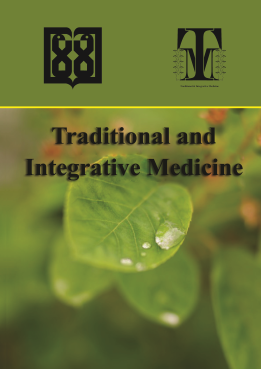Siman Mufrit: Concept, Pathophysiology and Management in Unani System of Medicine, A Review
Abstract
In Unani literature obesity is termed as simanmufriṭand farbahῑby Unani scholars.SimanMufritis classified as a balghamῑ(phlegmatic) disease. Literally simanmufriṭmeans excess of shaḥm (fat). Excess of shaḥm is due to burūdat(coldness)and ruṭūbat(wetness). The factors which increase the burūdatand ruṭūbat in the body are cold foods and drinks, cold medicines, rest, sleep, excess of food, moderate degree of pleasure, ḥammām especially after meals etc. According to Jālῑnūs, farbahῑ is caused either due to innate cold temperament or due to excessive adoption of bāridtadābῑr (cold regimens). He mentioned that, themāddῑ (material) cause of excessive body fat is presence of dusūmat (viscous substances) in blood and fa‘ila (active) cause is burūdatdue to which dusūmat of blood, solidifies and gets deposited in the form of shaḥm. Almost every great Unani scholar has devoted some pages to this old age enemy in their classical texts. They have given detailed description and discussion of simanmufrit and its various pathological conditions, pathophysiology along with its management.
Parray SA, Bhat J, Iqbal SMF, Ghufran A, Jahan N, Mahfooz R. Concept of obesity (SimanMufrit) and its consequences in Greeko-Arab medicine: A Review. Int J Herb Med 2012; 2:1-8.
Alam T, Hasan I, Parveen A, Nizamuddin M, Parveen S. Obesity (SamaneMufrat): down through the History. Int J CurrMicrobiol App Sci2013;2:173-178.
Williams G, Fruhbeck G. Obesity: sciencenafeesi to practice. John Willey & sons 2009; pp 1-5,24
Khan A. Rumooz-e-Azam. Vol 2. CCRUM.New Delhi 2006; pp 416-418.
IbneSina. Al Qanoon Fi Tib. Vol 4. IdaraKitabusShifa.New Delhi 2010; pp 1445-1447
Kabiruddin M. Ifadaekabir. CCRUM.New Delhi 2001; p 65.
Jalinoos. Kitab Fil Mizaj(Urdu translation by Zillur Rahman S). IbneSina Academy. Aligarh 2008;pp 138-141.
Jurjani I. ZakheerakhurarzamShahi. Vol 8. IdaraKitabusShifa.New Delhi 2010; pp 24-28.
Qarshi HMH. Jame-ul-Hikmat. IdaraKitabusShifa.New Delhi 2011; pp 873-876.
Baghdadi IH. KitabulMukhtarat fit Tibb.CCRUM. Ministry of Health & Family Welfare, Govt. of India. Vol 1&4. New Delhi 2005;pp 137-138, 263.
Ibn Nafees AH. MoalajateNafeesi (Arabic version).Munshi Naval Kishore.Lucknow 1324 Hijri;pp 537-540.
Qamri AMH. GhinaMunawatarjumaMinhajulIllaj. Ministry of Health and Family Welfare, Govt. of India.New Delhi 2008; pp 384-390
IbneRushd. KitabulKulliyat. CCRUM. Ministry of Health & Family Welfare, Govt. of India New Delhi 1987; pp 46, 344-346.
Khafir HA. Majmaul Bahrain. MatabaMunshi Naval Kishore.Lahore 1294; pp 40,599.
Kabeeruddin M. Kulliyat-e-Qanoon. S M Basheer and Sons; YNM.Lahore; p 155.
Majoosi AIA. KamilusSanah. Kantoori Ghulam Husnain. Vol 1 &2. Munshi Naval Kishore.Lucknow 1889; pp 52-56,102-104, 116.
Kausar C. Mojizul Qanoon. Qaumi Council BarayeFarogh Urdu Zaban.New Delhi 1998; pp 459-460.
Razi ABMBZ. KitabulHawi. Vol 6. CCRUM.New Delhi 1999; pp 183-205.
Ahmad R. TarjumaSharahAsbab. CCRUM. Ministry of Health and Family Welfare, Govt. of India.New Delhi 2008; pp 322-329.
Tabri R. FirdosulHikmat. CCRUM. Ministry of Health and Family Welfare, Govt. of India.New Delhi 2010;pp 246-248, 252-262.
| Files | ||
| Issue | Vol 5, No 1, 2020 | |
| Section | Review Article(s) | |
| DOI | https://doi.org/10.18502/tim.v5i1.2671 | |
| Keywords | ||
| Siman mufriṭ; Shaḥm; Māddῑ; Fa‘ila | ||
| Rights and permissions | |

|
This work is licensed under a Creative Commons Attribution-NonCommercial 4.0 International License. |




